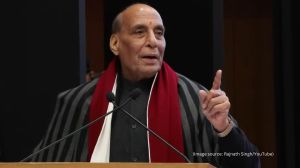4 takeaways from Uttarakhand’s Uniform Civil Code Bill: on live-in relationships, bigamy and more
Uttarakhand Uniform Civil Code Bill: Provisions of the UCC Bill do not apply to tribal communities and the Bill aims to regulate live-in relationships. Here are some of the major provisions.
 Uttarakhand Chief Minister Pushkar Singh Dhami, with others, holds a copy of the Constitution of India, at Vidhan Sabha Bhawan, in Dehradun, Tuesday, Feb. 6, 2024. (PTI Photo)
Uttarakhand Chief Minister Pushkar Singh Dhami, with others, holds a copy of the Constitution of India, at Vidhan Sabha Bhawan, in Dehradun, Tuesday, Feb. 6, 2024. (PTI Photo) Uttarakhand Chief Minister Pushkar Singh Dhami tabled the state’s proposed Unifrom Civil Code Bill in the Legislative Assembly on Tuesday (February 6). An expert panel had earlier made recommendations for the Bill, which seeks to “govern and regulate the laws related to marriage and divorce, successions, live-in relationships, and matters related thereto.”
Here’s what the Bill says on some major areas related to personal laws:
1. Provisions of the UCC Bill do not apply to tribal communities
Currently, personal laws in India are complex, with each religion following its specific regulations. The idea of the UCC is to create a set of uniform laws applicable to all the communities in India when it comes to personal laws on marriage, inheritance, divorce, etc.
However, this Bill’s provisions will not apply to tribal communities. The Bill says, “Nothing contained in this code shall apply to the members of any Scheduled Tribes within the meaning of clause (25) of Article 366 read with Article 142 of the Constitution of India and the persons and group of persons whose customary rights are protected under Part XXI of the Constitution of India.”
Given the unique customary practices of tribal communities, many have criticised the idea of the UCC over the years.
2. The Bill aims to regulate live-in relationships
The Bill makes it “obligatory for partners to a live-in relationship within a State, whether they are resident of Uttarakhand or not, to submit a statement of live-in relationship under sub-section (1) of section 381 to the Registrar within whose jurisdiction they are so living.”
The procedure for doing so is also mandated, where partners living together must submit a “statement of live-in relationship to the Registrar concerned…”
The registrar will then conduct a “summary inquiry” to ensure that the relationship does not fall under any of the categories mentioned under Section 380. This includes: “where at least one of the persons is a minor” and “where at least one of the persons is married or is already in a live-in relationship”.
For couples who have been in a live-in relationship for more than a month and have not submitted the statement, a punishment has been prescribed – with imprisonment up to three months or a fine up to Rs 10,000 or both.
Also, the registrar will have to be informed in case of termination of the relationship through the submission of a “statement of termination of relationship”.
3. The Bill prohibits bigamy or marriages with more than one person
Under Section 4, the Bill lists five conditions for marriage. It says a marriage may be solemnised or contracted between a man or a woman if those conditions are fulfilled. The first condition is: “neither party has a spouse living at the time of the marriage”, thus prohibiting bigamy or polygamy.
4. Marriage age of men and women, and “degrees for prohibited relationship” exception remain
The third condition under Section 4 on marriage relates to the minimum age for marriage. The marriageable age for men and women remains 21 and 18, respectively.
Under the fourth condition, the Bill retains the “custom” exception from the Hindu Marriage Act for married parties within the “degrees of prohibited relationships”.
Two people are said to be within the “degrees of prohibited relationship” if they share a common ancestry or they are the wife/husband of a common ancestor. This exception applies to those communities, which have an established custom allowing marriage within the degrees of prohibited relationships.


- 01
- 02
- 03
- 04
- 05




































